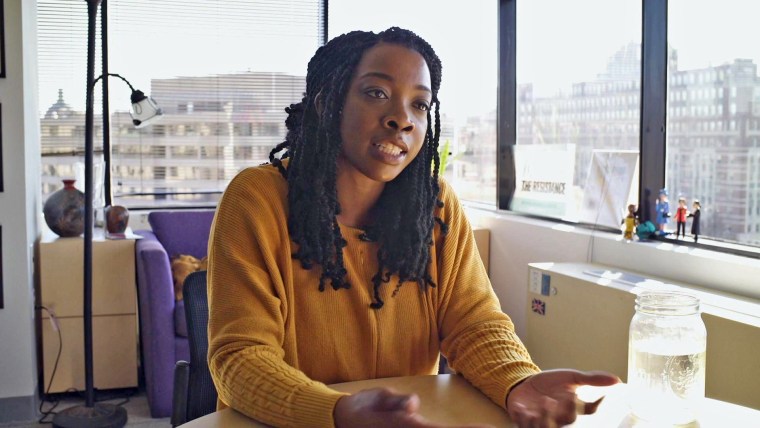A men’s rights activist who has used federal complaints to target women-only scholarships and programs is now trying to start a national movement to end what he sees as discrimination against men.
Over the past 15 months, the activist, Kursat Pekgoz, 31, a doctoral student in English literature at the University of Southern California, has filed federal Title IX complaints against three universities, and drafted complaints against three more, alleging that efforts to support female students are no longer necessary and amount to discrimination against male students. Once outnumbered, women now make up about 56.5 percent of students at American universities, notes Pekgoz, who has himself been the subject of a Title IX investigation into a sexual harassment allegation.
“I mean, obviously 40 years ago, I can kind of see why colleges would have … affirmative action preferences for women, when they were such a tiny minority,” he told NBC News. “But the underlying reality has changed.”
President Barack Obama spoke of “pursuing policies that help women succeed.” Today, under the Trump administration, the Department of Education is seriously examining Pekgoz’s claims that these kinds of policies, when implemented on college campuses, are discriminatory. Since October 2017, the department’s Office of Civil Rights has received eight complaints from Pekgoz and others alleging that women-only and women-focused scholarships, programs, spaces and campus clubs like Women in Business or Women in Science and Engineering are inherently prejudicial against male students — and thus violate Title IX, a federal provision that prohibits schools that receive federal funding from discriminating on the basis of sex.
The office has launched formal investigations this year into four of these complaints: three that Pekgoz filed — at Yale, Princeton and the University of Southern California — and a fourth at Tulane, a Department of Education spokesperson confirmed. The department did not undertake any similar investigations the previous year, and experts told NBC News that these probes are likely unprecedented.
As the Department of Education investigations proceed, some universities are already weighing responses to the complaints: Tulane will consider how to administer women’s empowerment programs without regard to sex, a spokesperson said, while Princeton has launched a self-defense initiative that is open to all students, not just women. The four universities under investigation have said that they are committed to nondiscrimination and are working with the Office of Civil Rights.
Supporters of programs and scholarships for women said they were troubled that the Trump administration is taking these complaints seriously.

“It is concerning that they’re not dismissing these complaints outright,” said Adaku Onyeka-Crawford, senior counsel for education at the National Women’s Law Center, a Washington-based nonprofit that advocates for women’s rights. “The Department of Education regulations specifically allow affirmative action programs.”
A Department of Education spokeswoman, Liz Hill, said in a statement to NBC News that the department was “committed to neutrally and impartially assessing individual claims on their merits. Opening a case for investigation is not a finding of wrongdoing.”
The department has dismissed some of the claims Pekgoz and others have filed, including his argument that the “overarching purpose” of USC’s Gender Studies Program was “to offer exclusive opportunities for women, at the expense of men.” In a letter in January, an Office of Civil Rights administrator wrote that Pekgoz had provided no evidence “that male students are excluded from or discouraged from participating” in the program.
Still, Pekgoz has set the course for a national conversation about how and whether to support gender equality in higher education at a time when Education Secretary Betsy Devos has declared her intention to radically alter other aspects of Title IX enforcement related to campus sexual assault. Pekgoz is allowed to file complaints against schools he has never attended because Title IX complaints can be filed by people who are not directly affected by the alleged infractions.
Pekgoz, a former member of the National Coalition for Men, a men’s rights group that has accused feminists of conspiring to hurt men, also has a personal history with Title IX. In 2015, two years before he filed his first Title IX complaint, a fellow USC student accused him of stalking and harassing her after a brief romantic relationship.
Pekgoz filed two counter-complaints, but USC’s Title IX office ultimately decided in the woman’s favor and ordered him to receive counseling. Pekgoz disputes the accusations and says they are unrelated to his Title IX activism.
THE CASE FOR TITLE IX ON CAMPUS
In 1948, women made up just 28.9 percent of post-secondary students in America. That balance was already shifting when President Richard Nixon signed Title IX into law in 1972. By 1981, women were earning more bachelor’s degrees than men, and they have every year since, according to the National Center for Education Statistics. Last year, women also earned 53 percent of Ph.D.s.
“A lot of the things we put in place to say, ‘We really have to help women feel more comfortable and more secure’ — the rationale for some of those things has disappeared,” said R. Shep Melnick, professor of American politics at Boston College and author of “The Transformation of Title IX.” “So now, when you look at who is not doing well in education, it’s the guys.”
Still, women remain underrepresented in a number of high-growth science and technology fields —they represent just 26 percent of people in math and computer professions, for instance. Women also earn less than men. Among 25-to-34-year-olds with a bachelor’s degree, the median annual earnings for men in 2016 were $59,960 — compared with $49,950 for degree-holding women.
Moreover, “not all women have seen the gains from affirmative action,” said Onyeka-Crawford, of the National Women’s Law Center, who notes that women of color are still underrepresented in higher education.
She said that while there may come a time a time to reconsider women-focused initiatives, “we’re not there yet.”
“In states where affirmative action bans have been implemented for race-conscious admissions, we’ve seen enrollment for people of color drop,” she said. “And so we’re really concerned that doing away with gender-inclusive programs would see the same thing for women, across the board.”
PEKGOZ’S TARGETS
Pekgoz told NBC News that he began thinking about anti-male discrimination on campus after reading a 1993 book, “The Myth of Male Power” by Warren Farrell, which disputes the notion that men hold disproportionate power in society. After being accepted to USC, and looking into scholarship opportunities, Pekgoz said he was irritated to discover funding earmarked solely for women.
He is dismissive of all efforts to aid women, even in disciplines where they are underrepresented. “What are you going to do with all the other disciplines in which women are the majority? Are you also going to create affirmative action programs for men in those disciplines?”
Critics say that Pekgoz profoundly misunderstands Title IX. The Department of Education allows schools to use affirmative action to correct for historical sex discrimination. It’s true that men may be underrepresented in, say, nursing — but not because of the same institutional discrimination that barred women from certain disciplines, said Jocelyn Samuels, a former director of the Office of Civil Rights at the Department of Health and Human Services.
And while women may have achieved parity in many educational fields, that classroom success isn’t always replicated in the real world, said Suzanna Danuta Walters, director of the Women’s, Gender and Sexuality Studies program at Northeastern University.
Female managers earn 77 percent of male managers, for instance, according to data from the Bureau of Labor Statistics. Women make up just 30 percent of university presidents and 5 percent of Fortune 500 CEOs.
“I will be sympathetic to these arguments when we have something like pay equity,” said Walters, who was named in a Title IX complaint drafted by Pekgoz and submitted by the National Coalition for Men, after publishing an op-ed titled “Why can’t we hate men?”
Asked why he chose to file complaints against Yale and Princeton — objecting to everything from Yale’s Women Empowering Women Conference to Princeton’s Rape Aggression Defense program for women — Pekgoz replied, “Why not?” He said his main objective was “to inspire others.”
COMPLAINTS GET ACTION
Pekgoz isn’t the first to file these types of grievances. He took inspiration from Mark Perry, a University of Michigan-Flint finance professor who has filed dozens of Title IX complaints with university Title IX offices, rather than with the federal government.

Perry filed his first complaint in 2016, after he learned that Michigan State University had a women’s lounge in its student union building, which he described as “gender apartheid.” Michigan State later opened the lounge to all students, though administrators said that the decision was made before Perry intervened, based on the concerns of male and transgender students. (An online petitioncalling for the women’s lounge to be reinstated received more than 5,400 signatures but did not change the school’s decision.)
Perry has now turned his attention to girls-only science and coding summer camps. Over the past two months, he has filed Title IX complaints with 23 universities, calling for the programs to be opened to boys.
He has reason to be optimistic. Last year, after he filed a similar complaint, the University of Michigan-Flint opened its Girls in Engineering Math and Science (GEMS) camp to boys, a university spokesperson confirmed. And in October, after Perry complained to the University of Minnesota-Twin Cities, his alma mater, the school agreed to open two scholarships for “women-identified students” to all applicants. Perry hopes these cases can serve as precedents for future complaints.
While many on USC’s campus oppose Pekgoz’s men’s rights campaign, he has found some local admirers and a warm audience online. He recently published a sort of how-to guide, which he called “How to Abolish Affirmative Action for Women.” And in recent months, he has received emails from students around the country who want assistance in filing Title IX complaints of their own.
Pekgoz’s favorite note came from one of his own students. It read: “You are the man!”

